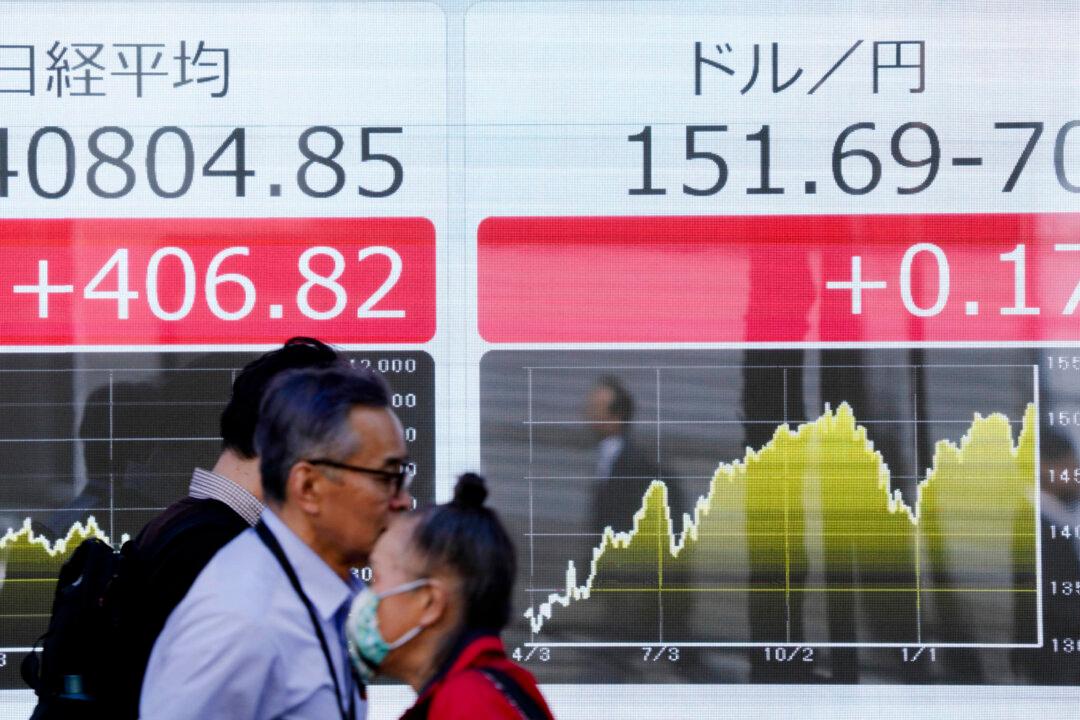For most of this century, the United States has run monetary policies similar to those of other major economies such as Europe, Japan, and China. Broadly similar interest rates matched underlying economic fundamentals, causing exchange rates to fluctuate within acceptable ranges. However, the post-COVID-19 bout of inflation in the United States has fundamentally changed this international monetary dynamic.
Countries run similar monetary policies because multiple economic factors allow them to run broadly consistent monetary policies. For example, a country with 5 percent real GDP growth and 2 percent inflation as its neighbor has 2 percent real GDP growth and 5 percent inflation. Using economists’ terminology, keeping the interest rate neutral could run broadly similar monetary policy and not have disruptive exchange rate flows.
We see examples of this very simple scenario in real life. When the United States and Japan both ran near-zero interest rates, the U.S. dollar and Japanese yen fluctuated between 100 and 120 for most of this century. However, the new inflation dynamic in the United States has upset this delicate balance.
Driven by record U.S. deficits, supply chain disruptions from the pandemic, and a tight labor market, inflation remains stubbornly high even after a decline. This has resulted in the Federal Reserve raising rates and vowing to keep them elevated. The problem for many countries such as Japan and China is that as the United States keeps interest rates elevated to tame inflation and cool the economy, Japan and China have weak economies teetering on deflation and desperately need lower interest rates.
Now, the problem of monetary divergence is showing up in exchange rates.
Since the beginning of 2021, the Japanese yen has fallen from 103 to the U.S. dollar to a recent low of 160. In the past year, it has dropped from 135. For investors, the option is simple: put their money into a U.S. government bond yielding 5 percent or a Japanese government bond yielding near zero.
This has a spillover effect on China. With China’s stagnant working-age population, slowing economy, and significant dependence on exports, there are more than a few similarities between China and Japan. However, they differ in their exchange rate regime, with China exercising strict capital controls and price setting by the central bank, whereas Japan’s exchange rate is mostly free. As Japan has allowed the yen to decline by about 50 percent over the past few years, the yuan has only decreased by about 10 percent. That enormous discrepancy between the fall in the yen and the yuan merely adds pressure to China on top of the interest rate discrepancies between the United States and China.
Whereas Japan opted to let its currency decline, Beijing has tried to maintain the yuan artificially high. While we cannot know for sure the reasons for this policy path, there are probable candidates that contribute to Beijing’s thinking.
First, by running effectively a fixed exchange rate regime with strict capital controls, any significant decline in the currency can quickly become a self-fulfilling prophecy as people try to hold hard currency. There are already significant indications that Chinese firms are trying to hold more hard currency offshore rather than onshoring their profits and U.S. dollars.
Second, given the trade tensions between the United States and China, Beijing is likely concerned about allowing the yuan to decline too much or too rapidly because of its already large trade surplus. While China may want to boost its exports, Beijing is likely concerned about going too far.
Third, the Chinese Communist Party has sought to establish itself as a competent manager that has brought economic prosperity, and any significant decline in the yuan will be an obvious indicator that it has not fulfilled its self-given mandate. People tend to notice a 50 percent decline in their currency, and in an authoritarian state, that grumbling becomes a problem.
Fourth, Beijing desperately needs the capital. Large swaths of the economy are teetering on the edge of bankruptcy, and banks are desperately short of capital. Any money leaving the Chinese economy or money that does not enter China should help push the yuan down.
With significant downward pressure on the yuan and Beijing’s actively trying to keep the currency elevated, the People’s Bank of China has done little to indicate a policy path forward. There is no doubt, however, that the decline of the yen is placing even more pressure on the yuan. Even if the yen does not strongly rebound or decline, any sustained level of the yen at a depressed rate will place enormous pressure on the yuan, and this does not consider the interest rate differentials we will continue to see between the United States and China.






